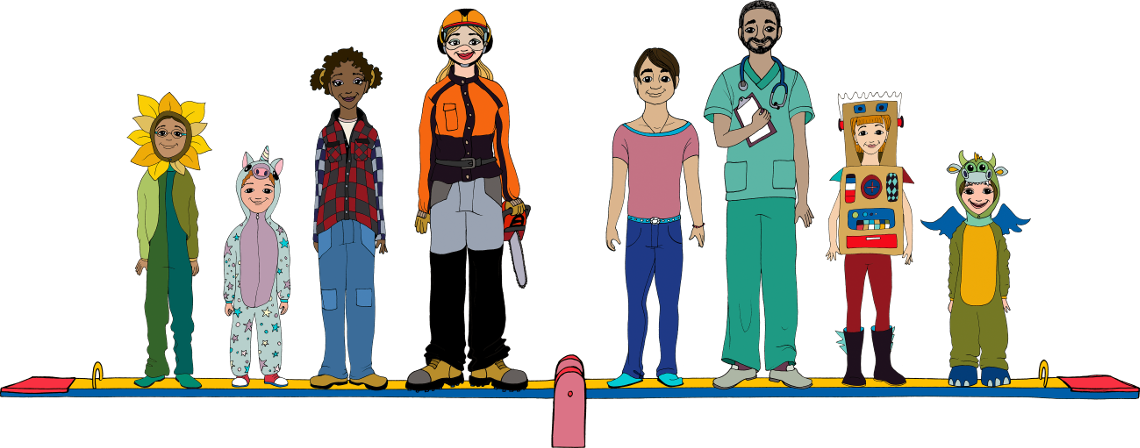Goals

Brief description of the issue
Indigenous women and girls are facing serious inequalities, both because of being First Nations and because of their gender. As early as in elementary school, girls are directed towards traditionally female roles by children’s books, stories and the media, show a lower level of self-confidence, speak up in front of the class less frequently than boys and have had fewer opportunities than boys to develop the skills needed to perform certain activities. All of these inequalities are deeply rooted in gender stereotypes associated with girls. Girls who embrace gender stereotypes the most also tend to drop out of school more than girls who go against them more. In order to foster school retention, concrete activities aiming at deconstructing gender stereotypes can be very helpful and spark interesting discussion with your group.
The Teaching Tolerance website has put together a variety of classroom resources in many social justice domains and on multiple topics. The mission of this organization is “to help teachers and schools educate children and youth to be active participants in a diverse democracy” by providing them free resources. The four-lesson unit Female Identity and Gender Expectations explores “different aspects of gender for today’s girls and women. Each lesson identifies barriers that limit girls’ and women’s opportunities and asks students to explore how those barriers can be dismantled.” The unit has been adapted for the needs of this project, but you can find the original activity here.
This unit on female identity, gender expectations and gender stereotypes unfolds in three lessons described below. Each lesson plan can be downloaded in the “Documents” section below.
Lesson 1, The Importance of Female Voices, examines the gender discrepancy among Wikipedia contributors. Students create their own class wiki in order to discover why, despite Wikipedia’s policy of openness, girls and women comprise only around 15-20% percent of Wikipedia contributors and why so many articles about notable Indigenous women are still missing.
Lesson 2, Girls, STEM and the leaking pipeline presents excerpts from a recent Girl Guides Canada study looking at the underrepresentation of women and girls in STEM fields, specifically looking at differences between white and racialized women.
Lesson 3, Gender and Jobs: Women in the Workforce helps students identify the industries in which women work, their rate of pay and how that pay compares to men’s pay using data from the Department of Labor of the United States as well as an infographic from Statistics Canada. Students question whether stereotypical ideas about women contribute to women’s work choices and why women still earn less than men in virtually every industry.
Documents
References
Balch, O. (2019, November 28). Making the edit: why we need more women in Wikipedia. The Guardian. https://www.theguardian.com/careers/2019/nov/28/making-the-edit-why-we-need-more-women-in-wikipedia
Canadian Women’s Foundation. (2018). Fact sheet: The Gender Gap in Canada. https://www.canadianwomen.org/wp-content/uploads/2018/08/Gender-Wage-Gap-Fact-Sheet_AUGUST-2018_FINAL1.pdf
Cohen, N. (2011, January 30). Define Gender Gap? Look Up Wikipedia’s Contributor List. The New York Times. https://www.nytimes.com/2011/01/31/business/media/31link.html?_r=1
Girl Guides Canada. (2020). Keeping Doors Open: Girls, STEM & Their Future Careers. https://www.girlguides.ca/WEB/Documents/GGC/Girl_Research/Keeping_Doors_Open/Keeping_Doors_Open_Full_Report.pdf
Maher, K. (2018, October 18). Wikipedia is a mirror of the world’s gender biases. Wikimedia Foundation. https://wikimediafoundation.org/news/2018/10/18/wikipedia-mirror-world-gender-biases/
Teaching Tolerance. (n.d.). Gender and Jobs – Women in the Workforce. Retrieved from https://www.tolerance.org/classroom-resources/tolerance-lessons/gender-and-jobswomen-in-the-workforce
Teaching Tolerance. (n.d.). Girls’ Attitudes About STEM Careers: Similarities and Differences Among Race/Ethnic Groups. Retrieved from https://www.tolerance.org/classroom-resources/tolerance-lessons/girls-attitudes-about-stem-careers-similarities-and
Teaching Tolerance. (n.d.). The Importance of Female Voices. Retrieved from https://www.tolerance.org/classroom-resources/tolerance-lessons/the-importance-of-female-voices
Wikipedia:WikiProject Women in Red/Indigenous Women. (n.d.). In Wikipedia, retrieved on August 5th, 2020, from https://en.wikipedia.org/wiki/Wikipedia:WikiProject_Women_in_Red/Indigenous_Women
Whose Knowledge? (n.d.). Public Online Knowledge, Whose Knowledge? https://whoseknowledge.org/issues/public-online-knowledge/
Zara, C. (2013, August 19). Wikipedia’s Gender Gap Persists: Why Don’t More Women Contribute To The Online Encyclopedia? International Business Times. https://www.ibtimes.com/wikipedias-gender-gap-persists-why-dont-more-women-contribute-online-encyclopedia-1390565
